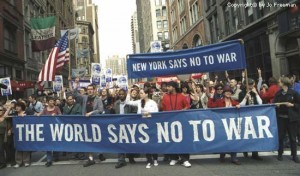This week in our ASTU class we analyzed Juliana Spahr’s book of poetry, This Connection of Everyone With Lungs. As the name suggests, her poems emphasize the connections between all people of the world, whether we make these connections voluntarily or involuntarily. Spahr’s second poem of her collection is written in a “process poem” format, similar to a diary entry, and common among most entries is a listing of news headlines and a tally of lives lost around the world. The speaker’s voice strikes a tone of frustration with our habit of isolating ourselves from global issues, as she writes with discontent that, “the world is a series of isolated, / burning fires” (Spahr 56). Spahr’s poems made me join her in frustration, and reminded me of an article that we read in our CAP Geography class.
In Geography we have discussed the “local” and the “global” as connected entities that affect and are affected by each other. Geographer Philip Crang’s article highlights the importance of not being trapped in thinking of only our immediate localities, while also not undermining the necessity of including the local in the context of global matters (Crang 17). His argument advocates for the same kind of inclusive thinking as Spahr’s poetry. To exemplify how global issues have been responded to on a local level, I’d like to draw your attention to the section of Spahr’s second poem titled with an important historical date: “February15, 2003” (Spahr 53).
Activists protesting in the global Anti-Iraq invasion in New York and Amsterdam respectively.
This day marked one of the largest global protests to date, where millions of people gathered to stand against the Iraq war and begged for a peaceful resolution. As Spahr writes, this remarkable turnout of global activism gave a “glimmer” of hope for progress toward a more unified stand on global issues (Spahr 58).
Although this show of activism lit a flame of optimism for some, it made me concerned about the 21st century ‘slacktivism’ we face today. It is becoming less common to take visible stand for the issues we care about, and more common to passively intake news headlines through our smartphones, and click ‘share’ on Facebook articles, with little to no follow-up action. I worry for our possibility of being able to share another ‘glimmer’ of hope that Spahr spoke so optimistically about. Perhaps the continuation of discussion of local-global relations across many disciplines will encourage us to work to become a more active generation of global citizens.
Works Cited
Images:
Retrieved from: http://www.democraticunderground.com/discuss/duboard.php?az=view_all&address=104×3854661
Retrieved from: http://hellaheaven-ana.blogspot.ca/2010/10/february-15-2003-iraq-anti-invasion.html
Texts:
Crang, Philip. Introducing Human Geographies. London: Hodder Headline, 2005. p. 34-50.
Spahr, Juliana. This Connection of Everyone with Lungs: Poems. Berkeley: U of California, 2005. Print.

